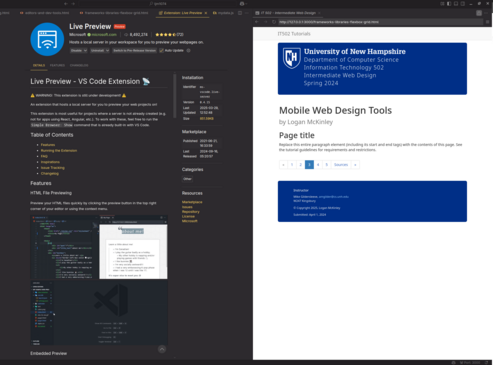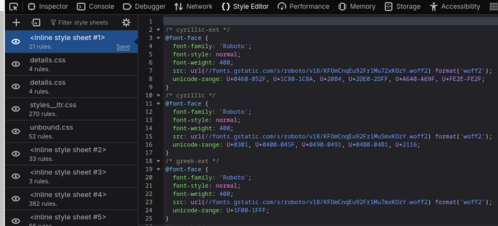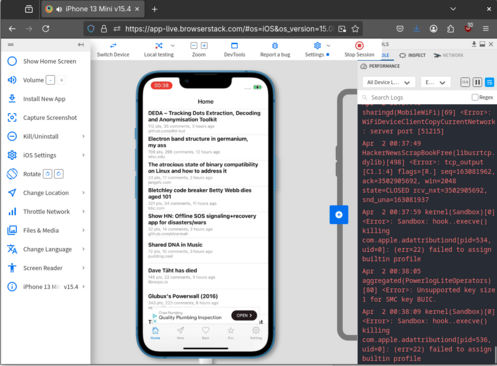Design Template by Anonymous
Code Editors, IDEs, and Browser Development Tools
There are many different tools available that help assist developers in writing effective and efficient code. Of these tools, the most common are code editors, Integrated Development Environments (IDEs), and developer tools. Well-written code is important for many reasons. If a website has code that is not well written it can lead to performance issues, security vulnerabilities, an overall poor user experience and can hinder development if the code is not well organized. It is important to know which tools to use for each situation.
Code Editors
Code editors are lightweight text editors that are helpful for writing code. They support the ability to configure the editing environment to suit the needs of the developer. This includes things like syntax highlighting, auto-completion, auto-formatting, and many extensions/plugins that can be installed. Some of the more popular code editors are Visual Studio Code, Notepad++, Sublime, and Vim.

In the image above it shows an instance of Visual Studio Code running the Live Preview extension which allows you to see the updates to your webpage in real time. This is incredibly useful because it is not necessary to have to switch out of the Code Editor frequently to see the changes. Many other extensions and plugins exist to make developers lives easier such as collaborative editing, debugging, and version control.
Ultimately:
- Code Editors are lightweight and fast.
- They are great for writing code quickly.
- They have many plugins/extensions to help with development including enabling a collaborative work space where developers can work on the same codebase at the same time.
- They are not as powerful as IDEs but require less resources to use.
Integrated Development Environments
Integrated Development Environments (IDEs) are more powerful than code editors. They are designed to be a centralized location for all of the needs of a developer and they come fully preconfigured with language support. They have many of the same features as code editors but also have built in debugging, testing, and deployment tools. Some of the more popular IDEs are Visual Studio, Eclipse, PyCharm and IntelliJ. IDEs are great for larger projects that require a large number of different tools to be used. They also allow large teams of developers to have an identical environment to work in. This is incredibly important because having an inconsistent configuration can lead to issues when deploying the code.
However, IDEs are built for a specific purpose/workflow. This means that it is packed full of tools and software that devleopers may not necessarily need. This can lead to a slower experience and a learning curve that feels overwhelming due to the sheer number of features. That is why it is important to to know when to use an IDE and when to use a code editor.
Browser Developer Tools
Browser Developer Tools are built into most modern browsers. They allow developers to inspect the HTML and CSS
of a webpage and see how it is rendered in real time. This is very helpful
for debugging and finding if rules are being written incorrectly or overwritten altogether. The developer tools
also have a built in console that
allows developers to run JavaScript code in real time. This is incredibly useful for testing and debugging
JavaScript code. In addition there is the Network tab which allows developers to see each request and the amount
of time they took to fulfill. This is very helpful for finding problem areas where content takes too long to
load. Then there's the Styles tab
which allows developers to see the CSS styles that are currently applied to each element.

Cross Browser Testing Tools
Cross Browser Testing Tools are used to test how a website looks and functions in different browsers. This is important because different browsers can render the same code differently. This can lead to issues where a website looks and functions perfectly in one browser but not in another. Some of the more popular cross browser testing tools are BrowserStack, LambdaTest, and QA Wolf (popular for its code generation). These tools allow developers to test their websites in different browsers and devices without having to locally simulate the device or physically acquire it.

Summary:
- Code Editors are lightweight and fast.
- They are great for writing code quickly.
- They share many functionalities (IDEs are essentially comprehensive preconfigured Code Editors)
- They have many plugins/extensions to help with development including enabling a collaborative work space where developers can work on the same codebase at the same time.
- Browser Developer Tools are essential for debugging and ensuring a webpage functions as expected.
- Use developer tools in other browsers as well because dev tools have different features that can be leveraged. Like Google Lighthouse which has integration with google dev tools and allows developers to easily test the performance of their website.
- Cross Browser Testing Tools are used to test how a website looks and functions in different browsers.